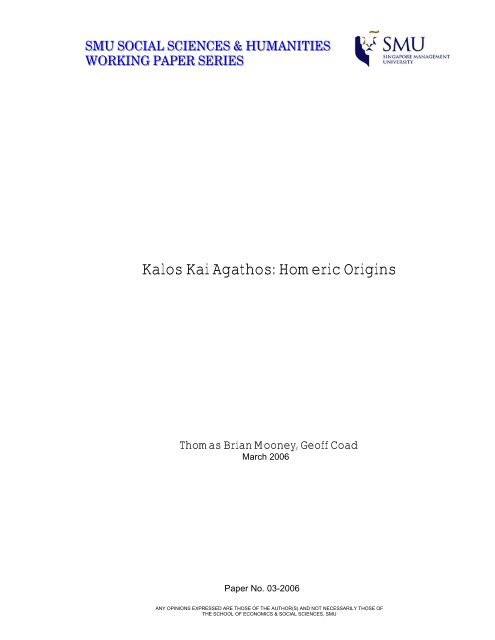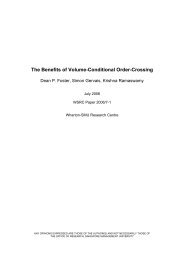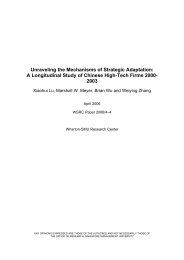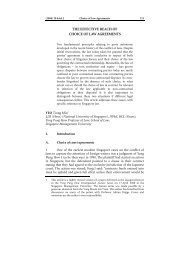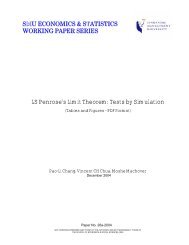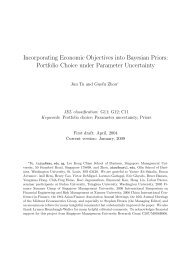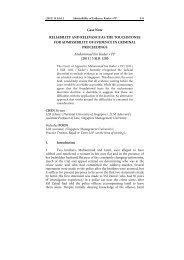You also want an ePaper? Increase the reach of your titles
YUMPU automatically turns print PDFs into web optimized ePapers that Google loves.
SMU SOCIIAL SCIIENCES & HUMANIITIIES<br />
WORKIING PAPER SERIIES<br />
<strong>Kalos</strong> <strong>Kai</strong> <strong>Agathos</strong>: <strong>Homeric</strong> <strong>Origins</strong><br />
Thomas Brian Mooney, Geoff Coad<br />
March 2006<br />
Paper No. 03-2006<br />
ANY OPINIONS EXPRESSED ARE THOSE OF THE AUTHOR(S) AND NOT NECESSARILY THOSE OF<br />
THE SCHOOL OF ECONOMICS & SOCIAL SCIENCES, SMU
KALOS KAI AGATHOS: HOMERIC ORIGINS<br />
I<br />
In this paper we will trace the philosophical and historical development of the notion<br />
of the kalos kai agathos in Homer. The notion of the kalos kai agathos is a relatively<br />
late linguistic innovation, which achieves its fullest significance in the fourth<br />
century 1 . Nevertheless, there appears to be sufficient evidence to indicate that the<br />
nexus of connotations associated with the late fourth century development stretches<br />
back at least as far as Homer. This paper, therefore, will require an analysis of<br />
cognate terms from which the idea and the historical, sociological, ethical, political<br />
and ontological dimensions of kalos kai agathos develops.<br />
To date, there have been only three major publications concerning the origin and<br />
meaning of the term kalos kai agathos. Hermann Wankel 2 wrote a dissertation in<br />
1961, Walter Donlan 3 wrote an article reviewing Wankel’s thesis in 1973 and in 1995<br />
Felix Bourriot 4 wrote a two volume work in which he traced the term kalos kagathos<br />
from Herodotus in the fifth century to Aristotle.<br />
Hermann Wankel maintains that the term kalos kai agathos existed as an attribute of<br />
the aristocracy as early as Homer, and during the archaic period was subjected to an<br />
umwertung (re-evaluation) by the aristocratic poets 5 . His argument is that the poets<br />
1<br />
Donlan, W., (1973), “The Origin of <strong>Kalos</strong> kagakos”, The American Journal of Philology, Vol 94, No.<br />
4., (1973), pp. 365 – 374.<br />
2<br />
<strong>Kalos</strong> kai <strong>Agathos</strong> (diss. Wurzburg, 1961).<br />
3<br />
Donlan. W, op. cit.<br />
4<br />
Bourriot. F, (1995), KALOS KAGATHOS – KALOKAGATHIA - D’UN TERME DE PROPAGANDE<br />
DE SOPHISTES `A UNE SOCIALE ET PHILOSOPHIQUE – Etude d’Histoire athenienne, Georg<br />
Olms Derlag, Hildesheim,. Zurich. New York.<br />
5<br />
Wankel, H., pp. 12-13.<br />
1
purged the original meaning of its purely social connotations and it gradually became<br />
an ethically charged term. Wankel goes on to say that in the late part of the fifth<br />
century the term kalos kagathos became a political catchword by the oligarchical<br />
elements reacting to those members of society who questioned the aristocratic claim<br />
to exclusively use the term 6 .<br />
Wankel drew upon various philological studies of the term from C. Kohnhorn 7<br />
through to W. Jaeger’s Paideia 8 , although his thesis is indebted to the dictum of W.<br />
Jaeger, who maintains of the development of the term in Greek that:<br />
Culture is simply the aristocratic ideal of a nation, increasingly intellectualised 9<br />
Wankel also draws upon a theory proposed by Nicolai Hartmann 10 that the concept of<br />
aristocracy does not consist merely in political, social and economic pre-eminence,<br />
but it represents the inherent ethical tendency of the aristoi not only to kratein (to be<br />
descended from) but to arista legein (to select the best). By this, Hartmann meant that<br />
the Greek aristocrat, “was not simply the product of a particular class structure, but<br />
was also a conspicuous axiological exemplar”. He was “even in his basic tendencies<br />
somehow already morally in advance”. 11<br />
Building upon these two ideas Wankel sought to find the marriage of the beautiful and<br />
the good in archaic Greece by constructing an ethical – aesthetic sphere of meaning<br />
6<br />
Wankel, H., p. 14.<br />
7<br />
Kohnhorn, C., (1850), Kalo Kagathia, Graecorun ex locis Xenophontis adumbrata; Progr. Neisse p.p.<br />
3 - 13. See generally Warner, R., (1979), Xenophon – A History of My Times, Penguin Books Limited,<br />
London, England.<br />
8<br />
Jaeger. W, (1967), Paideia: The Ideals of Greek Culture – Volume 1, Oxford University Press, New<br />
York, Oxford, p. 4.<br />
9<br />
Quoted in Op. Cit, Donlan. W., p. 365 – 366.<br />
10<br />
Ethik, Third Ed. [Berlin 1949] pp. 391-401.<br />
11<br />
Wankel. H., p. 16.<br />
2
grounded in the aristocratic value system 12 . However, the philological evidence in<br />
support of his quest is less than satisfactory.<br />
Bourriot holds that the term came into attic Greek from Sparta where it described a<br />
class of Spartiates remarkable for their ability in battle 13 . Then in the last part of the<br />
fifth century the term became associated with young “snobs”, such as Alcibiades 14 .<br />
In the last decade of the fifth century the term was used to refer to the bourgeois<br />
supporters of the oligarchs of Thermanes 15 . Then in the fourth century the terms<br />
assumed two different meanings, one dealing with social status and the other with<br />
moral and civic virtue 16 . According to Bourriot the culmination of the development<br />
of the terms is to be found in Aristotle’s Eudemian Ethics, there they enjoy a special<br />
place as the complete moral excellence which can only be achieved by a leisured<br />
social and intellectual elite 17 .<br />
Bourriot rejects Wankel’s conviction that there is a tradition of kalos kai agathos as<br />
an Hellenic ideal dating back to the <strong>Homeric</strong> poems. Instead, Bourriot maintains that<br />
the term was first used in the fifth century by the historian Herodotus 18 , and in this he<br />
is correct. However, Bourriot traces the term only from the philological point of<br />
view. He concludes that each author is entitled to adopt his own approach to what<br />
these words mean. He says essentially that each author has:<br />
12<br />
Op. Cit, Donlan, W., p. 365.<br />
13<br />
Cairns, D.C. (1995), The Classical Review, Vol. No. 45, London: D. Nutt, p. 75. See Bourriot, Op.<br />
Cit. Vol. 1 p. 35.<br />
14<br />
Alcibiades was a politician in Athens after the Peloponnesian War. When Socrates asked him who<br />
were kaloi kagathoi he responded the politicians. The thirty tyrants were now the ruling party and thus<br />
considered themselves kaloi kagathoi. Alcibiades was one of these. See Cairns D.C., Op. Cit. p. 75.<br />
15<br />
Cairns, D.C., p. 75. These oligarchs similarly arrogated to themselves the title because they<br />
considered that now they were the aristocrats.<br />
16<br />
Cairns, D.C., p. 75.<br />
17<br />
Cairns, D.C., p. 75.<br />
18<br />
Bourriot, F. p. 117. Vol. 2. (Notes).<br />
3
His own type of kalos kai agathos. 19<br />
Thus, by focusing attention on the philology, Bourriot divorces the evolution of the<br />
term from its wider socio/political and philosophical significance. Bourriot’s research<br />
uncovered a superficial and relativistic use of the term. In this paper we are looking<br />
to uncover the steady growth of the historical, sociological, ethical, political and<br />
ontological dimensions of the term.<br />
Walter Donlan denies that the term was used earlier than the fifth century when the<br />
historian Herodotus first used the words kalos kagathos 20 . Donlan’s article was<br />
written to refute the tenet of Wankel that kalos kagathos existed as an attribute of the<br />
aristocracy as early as Homer. Donlan traces the use of the term agathos through the<br />
300 years or so between the <strong>Homeric</strong> times and Herodotus. He observes that the<br />
traditional claim of the aristocracy to the title agathoi was in jeopardy by the last third<br />
of the sixth century. Coined money and the rise of mercantile classes had made it<br />
possible for people of less than good birth to attain wealth 21 . As wealth was<br />
traditionally considered to be one of the necessary conditions of being agathos,<br />
people that had hitherto been kakoi (bad, non aristocratic, vulgar) were now agathoi.<br />
Theognis seems to reflect this meaning in discussing the discontented nobles - men<br />
who formally wore goat skins and pastured like deer “outside” the city. He says:<br />
These are Agathoi, son of Polypaus; and those<br />
Who were once Esthloi are now Deiloi 22 (57 – 58)<br />
According to Donlan, soon after the last third of the sixth century the aristocracy<br />
arrogated to themselves the term kalos 23 . This is because as a class they generally<br />
19<br />
“Autant d’ecrivains, Autant de types de kalos kagathos”. See Bourriot, F., Op. Cit, pp. 131-162, Vol<br />
2. (Notes).<br />
20<br />
Donlan. W., p. 374. See Herodotus, The History, Great Books of the Western World 1.30.4<br />
21<br />
Bowra, C.N., (1957), The Greek Experience, Mentor Books, p. 89.<br />
22<br />
Deiloi was used by Theognis to mean a kakos, or beggar. Theognis’ point was that the social strata<br />
system had been inverted. Gerber (2003), Theognis 1109-14. The Loeb Classical Library p. 337, The<br />
President and Fellows of Harvard College<br />
4
possessed a physical beauty that people in the lower social classes were deemed not to<br />
exhibit 24 .<br />
It is our contention that while these studies have contributed enormously to the<br />
philological understanding of the development of the notion of kalos kagathos,<br />
particularly in respect to social, political and ethical developments, nevertheless,<br />
much is left out of the picture. In particular, we will argue that the term kalos<br />
kagathos is the culmination of a series of tensions in the philosophical understanding<br />
of value in ancient Greece that can be traced back at least as far as the <strong>Homeric</strong> epics.<br />
In particular, we wish to emphasise an unrecognised ontological dimension to the<br />
Greek conception of value. In this respect we will provide a reading of the <strong>Homeric</strong><br />
epics that distinguishes, unlike the canonical secondary literature (Adkins 25 ,<br />
MacIntyre 26 , Cornford 27 , Dodds 28 et al), who merely provide a descriptive account of<br />
the social and moral attributions of the worth of <strong>Homeric</strong> times, a disparity between<br />
what is often referred to as <strong>Homeric</strong> value from the intention of Homer, to provide a<br />
moral analysis grounded in an ontology of the disintegration of the so-called <strong>Homeric</strong><br />
value system. In other words we want to provide a hermeneutic analysis of the epics<br />
(particularly, the Iliad) that distinguishes the historical nature of ‘<strong>Homeric</strong> value’<br />
from the <strong>Homeric</strong> intention to critique this very system.<br />
II<br />
23<br />
Donlan, W., p. 372<br />
24<br />
Donlan, W., p. 372.<br />
25<br />
Adkins, A.W.H., (1960), Merit and Responsibility – A Study in Greek Values, Clarendon Press,<br />
Oxford.<br />
26<br />
MacIntyre, A., (1966), A Short History of Ethics, London, Routledge & Keegan Paul.<br />
27<br />
Cornford, F. M., (1957) From Religion to Philosophy, Harper Torch Books, New York.<br />
28<br />
Dodds, E.R., (1951), The Greeks and the Irrational, University of California Press, Berkeley and Los<br />
Angeles.<br />
5
The word agathos in Homer meant kingly, courageous or cunning, and so, the<br />
question, “is he agathos?” is the same as the question, “is he kingly, courageous,<br />
clever and cunning?” So in the <strong>Homeric</strong> epics this type of behaviour is sufficient to<br />
entitle a man to be called agathos 29 . So, when Agammenon intends to steal the slave<br />
girl Briseis from Achilles 30 he is still held to be agathos, whether he takes her or not,<br />
because the term is used in its sociological aristocratic meaning. This is because<br />
agathos is tied so completely to the fulfillment of function. A deviation of the kind<br />
Agammenon has in mind will not affect his ability to fulfill his social status and<br />
functions.<br />
Arete (virtue) in <strong>Homeric</strong> times was related to fulfilling one’s social and professional<br />
roles. However, the arete of one social function is quite different from that of<br />
another. Thus a king’s arete lies in his ability to command, and a cobbler’s in his<br />
skill at making shoes. A man has arete if he has the arete of his particular social<br />
function 31 , for instance, if he is a good cobbler, thus, he fulfills the telos (goal) of<br />
making good shoes. Aside from the central and enduring attributions of value<br />
captured by the terms agathos and arete, several other words were in popular coinage<br />
which also indicated forms of worth and value.<br />
Another Greek term of value in <strong>Homeric</strong> times is kalos. This appears never to have<br />
signified any indication of class in Homer 32 . It was a general predicate of beauty and<br />
was used of men, women and things, always with the same meaning 33 . It appears in<br />
the broadest terms to have referred to external physical appearance. More than forty<br />
29 MacIntyre, A., p. 6.<br />
30 Iliad. Book 1. quoted in MacIntyre, A., p. 6.<br />
31 MacIntyre, A., p. 8.<br />
32 Donlan. W., p. 367.<br />
33 Donlan, W., p. 368.<br />
6
uses of the word appear in the lyric poets and there is only one exception to its being<br />
used as an explicit reference to external beauty 34 .<br />
Most commentators seem to agree that the term esthlos 35 is a synonym for agathos<br />
and has nothing to do with inner moral worth, but once again is a social attribute like<br />
agathos, relating to excellence of function. esthlos is used in the Iliad of a man who<br />
could execute a good throw 36 . Again in the Iliad, it was used of horses to mean well<br />
bred 37 . Another example of the use of esthlos is when Nestor urged Agammenon to<br />
re-organise his troops into fighting units instead of an unruly mass so that he may be<br />
able to tell who is esthloi and who is kakoi 38 . Kakos is the corresponding word of<br />
denigration in the sense that, the kakoi do not fulfil the social obligation/duty of their<br />
function.<br />
Aischron, and its relative elencheie 39 are derogatory terms. The terms designating<br />
various conceptions of worth have their counterparts in several words which connote<br />
their opposites. Elencheie is the state of mind of having done something aischron,<br />
(shameful), it is the condition of an agathos who has behaved as a kakos. This is<br />
illustrated in the Iliad II when Odysseus says to Agammenon:<br />
Now the Greeks are willing to make you most contemptible (elenchistos), in the eyes of all<br />
mortal men; and they will not fulfill the promise which they made when they were still on the<br />
way here from Greece, that they would return home only when they sacked Troy 40 .<br />
He admits that long campaigns are hard so that the Greeks are to be excused for<br />
wanting to go home, but nevertheless maintains that it is aischron to remain a long<br />
34<br />
The Saffo Fragment. Fr. 50, p. 97, The Loeb Classical Library.<br />
35<br />
Adkins, W., p. 32.<br />
36<br />
Book XV, p. 283.<br />
37<br />
Book XXIII, p. 348.<br />
38<br />
Iliad II 365, C. P. Odyssey V III 512 mentioned in Adkins, W. (1960), Op. Cit, p. 32.<br />
39<br />
Adkins, W., p. 33.<br />
40<br />
Adkins, W., p. 33.<br />
7
time and return empty handed 41 . Once again we see a key feature of <strong>Homeric</strong> value<br />
systems in that “success” is a central determinant of functionality.<br />
Aischos, the adjective aeikelios, the adverb aeikelios is used to decry breaches of co-<br />
operative values 42 . The effect of its use is to draw attention to the condition of<br />
anyone being mistreated, such as the serving maids being dragged through the<br />
palace 43 in the Odyssey. As we shall presently show this seems to intimate that there<br />
are internal values which run counter to the received ‘<strong>Homeric</strong>’ view. Aidos is a word<br />
that is closely related to defeat and elenchos. An example is when Hera shouts to the<br />
Greeks:<br />
Aidos, for shame! Base elenchea 44<br />
These are the key terms of value in Homer’s Iliad 45 . Both Wankel and Bourriot used<br />
them in the way Adkins describes their meaning in his seminal work, Merit &<br />
Responsibility.<br />
III<br />
It is our contention that a distinction has to be drawn between Homer’s intention in<br />
writing the epics and the social conception of <strong>Homeric</strong> morality which provides the<br />
sociological backdrop to the times within which the stories unfold. Homer is teasing<br />
out the implication of the moral and political disorder of his times, by pointing out the<br />
moral ruptures in order and their causes. Thus, he is pointing to a deeper<br />
understanding of the sphere of the ethical and abstracting to an order of timeless<br />
reality which is reflected in some of the leitmotifs of the epics.<br />
41<br />
Iliad II 284 ff 4, cp. 119 ff. quoted in Adkins, W. p. 33.<br />
42<br />
Adkins, W., p. 41.<br />
43<br />
Odyssey XVI. 108 ff. quoted in Adkins, W., p. 41.<br />
44<br />
Iliad V. 787 quoted in Adkins, W., p. 43.<br />
45<br />
Adkins, W., p. 45.<br />
8
This reading appears to conflict with much of the secondary and canonical literature<br />
on Homer. In his book A short history of Ethics Alasdair MacIntyre deals with what<br />
he calls The Pre-Philosophical History of “Good” and the Transition to Philosophy<br />
in the second chapter 46 . For MacIntyre, the term agathos relates solely to a<br />
judgement that can be passed upon a man concerning the way in which he discharges<br />
his social function 47 , of the status he is born into. MacIntyre acknowledges that<br />
whilst the Greek word agathos is similar to our english word ‘good’ it differs, in that,<br />
for us a man may be kingly courageous or cunning, but need not necessarily be good,<br />
whereas in Homer he is agathos if he fulfils his social function. MacIntyre correctly<br />
observes that in the <strong>Homeric</strong> epics a man simply has to behave in a certain way to<br />
entitle him to be called agathos, and further, that this is in no sense evaluative in any<br />
deeper moral sense, in which one might conceive of a relationship between<br />
motivation and action. In other words it is a matter of external ‘show’. MacIntyre<br />
concludes that there is a gulf between the fact of calling a man agathos and appraising<br />
his behaviour when he says:<br />
“The alleged logical gulf between fact and appraisal is not so much one that has been<br />
breached in Homer. It has never been dug. Nor is it clear there is any ground in which to<br />
dig 48 .”<br />
We will show that this indicates a very superficial reading of the <strong>Homeric</strong> epics.<br />
MacIntyre is confining himself to a philological examination of the social context in<br />
which the terms agathos and arete are used in Homer. There is no internal moral<br />
dimension to the term agathos when used of a man. Because of this there is no<br />
deliberation as to the cause of a man’s actions.<br />
46 MacIntyre, A., p. 5 et seq<br />
47 MacIntyre, A., p. 5.<br />
48 MacIntyre, A., p. 7.<br />
9
It will now be useful to consider MacIntyre’s evaluation of what was meant in<br />
<strong>Homeric</strong> times by the use of the word arete, a cognate of agathos. A man who<br />
performs his social function also possesses arete. Provided a man is careful enough<br />
to perform his social function he cannot lose his arete nor can he be said to cease to<br />
be agathos. MacIntyre sees <strong>Homeric</strong> society as a unified one in which evaluation can<br />
depend upon established criteria of a family of concepts which presuppose a certain<br />
social order. This social order in Homer is characterised by a recognised hierarchy of<br />
functions 49 .<br />
In recognising that Greek <strong>Homeric</strong> society needed a place for everyone and<br />
everybody in his/her place, MacIntyre very nearly grasped the thrust of Homer’s<br />
morality tale. He recognised society as functioning well with each person fulfilling<br />
his/her arete, but failed to penetrate below the surface of this social structure to see<br />
the gradual drawing out and improvement of the inner harmony and excellence of<br />
functioning in the individuals making up that society. MacIntyre stopped short of the<br />
hermenutic analysis we are undertaking.<br />
A different approach to <strong>Homeric</strong> times is taken by E.R. Dodds in his book The Greeks<br />
and the Irrational 50 . He is dealing with religion and its psychology in Homer. Once<br />
again, however, the perspective taken is one that details the externalist perspective in<br />
morality. He examines the growth and meaning of the terms ate, moira and menos in<br />
the epics. When Agammenon compensated himself for the loss of his own mistress<br />
by robbing Achilles of his, he evaded responsibility by saying that the god Zeus had<br />
put ‘wild ate’ in his understanding 51 . This excuse would be readily acceptable, not<br />
49<br />
MacIntyre, A., p. 8.<br />
50<br />
Dodds, E.R., (1951), The Greeks and the Irrational, University of California Press, Berkeley and Los<br />
Angeles.<br />
51<br />
Dodds, E.R., p. 3.<br />
10
only by Agammenon, but by Achilles because under the received account early Greek<br />
justice cared nothing for intent – it was the act that mattered 52 . This, indeed, is the<br />
position that we set ourselves against. He is abrogating moral responsibility and<br />
thrusting blame onto the gods. But Homer makes his own position clear having<br />
Nestor presents the case from the perspective of practical reasonableness 53 . On the<br />
other hand, he is not dishonestly inventing a moral alibi, because the victim of his<br />
action takes the same view of it as he does, though not the one, we argue, that Homer<br />
intends. E. R. Dodds explains that ate means a temporary clouding or bewildering of<br />
the normal consciousness 54 . He does not deal with the terms agathos and arete, but<br />
observes that in Homer man’s highest good is the enjoyment of time, (honour or<br />
public esteem). Once again, this is a powerful presentation of the externalist<br />
perspective in Homer.<br />
According to Dodds, the most powerful moral force known to <strong>Homeric</strong> man is not the<br />
fear of God, but, rather the fear of ridicule from his fellow man. Man lived in a<br />
shame culture where public opinion was the paramount consideration, as is reflected<br />
in the use of the terms aidos, (shameful): aideomai, (I shame myself). The reflexive<br />
use of the verb aideomai 55 is the only one that occurs in the <strong>Homeric</strong> epics. However,<br />
the reflexive usage seems to suggest that there is more to shame culture than what<br />
other people will think of one’s actions. The use of aideomai implies a consciousness<br />
in the agent of having done something shameful before the perception of his act<br />
registers with onlookers. In failing to consider the etymology of the verb aideomai<br />
and the consequences of the use of the reflexive tense of it in the <strong>Homeric</strong> epics,<br />
Dodds misses an opportunity to penetrate beneath the philological level at which he<br />
52 Dodds, E.R., p. 3.<br />
53 See our discussion on p. 22.<br />
54 Dodds, E.R., p. 5.<br />
55 Liddell & Scott, (1996), Greek – English Lexicon, Clarendon Press, Oxford, pp. 35-36.<br />
11
has set his investigation and present a deeper psychological insight into the morality<br />
tale. Had the transitive of the verb been in use in Homer it would have suggested a<br />
person outside of the speaker and thus been a judgement of somebody else’s conduct<br />
rather than one’s own 56 .<br />
Again the importance of time and its inseparability from the shame culture is<br />
indicated in several important passages in the Iliad, for example, Hector showing that<br />
he values time above all else when before going out to fight Achilles he says to<br />
Andromache as she urges him to remain in safety within the walls of Troy:<br />
“I feel shame, (aideomaie) before the Trojans, both men and women, if like kakos I skulk<br />
away from the wall 57 ”.<br />
Wender seems to agree when she says:<br />
“The sense of shame, aidos is important ... For the early Greeks, shame – the fear that one’s<br />
peers would think badly of one – was what kept a man from wrong doing 58 ”.<br />
Time is important to Helen when she says to Hector of Paris ... “would ... that I had<br />
been wife to a better man – to one who could smart under dishonour (atime), and<br />
mens’ evil speeches 59 ”. Helen was reflecting on the hesitation of her beloved to<br />
follow Hector into battle.<br />
However, this is not the only way in which the term ate was used. It involved any<br />
mental lapse that could be ascribed to the agency of an external daimon or higher<br />
power. An example is found when Glaucus swapped gold armour for bronze 60 . In<br />
56<br />
In English the transitive verb ‘shame’ means to cause to feel shame; to disgrace. Blackies’ Compact<br />
Etymological Dictionary, Blackie & Son Ltd, London and Glasgow, p. 295. Nevertheless this<br />
argument may be countered with the idea that the shame one feels is nevertheless still attributable to<br />
the social context.<br />
57<br />
Adkins, A. W. H., Op. Cit., p. 47. See Iliad 22.105.<br />
58<br />
Wender, D, (1973), Hesiod & Theognis, Penguin Books, London, p.159.<br />
59<br />
Iliad 6.351.<br />
60<br />
Dodds, E.R., p. 4.<br />
12
Homer the source of ate is often attributed to daimonic agency 61 . This is clearly<br />
illustrated in Agammenon’s dream 62 . Zeus sent a dream to Agammenon to tell him to<br />
prepare his Achaean forces for battle against the Trojans at once, despite knowing<br />
from a previous message of the gods that they could not win without Achilles. Zeus<br />
told the dream to assume the identity of Nestor, Agammenon’s most valued and<br />
trusted councillor. Agammenon was under no illusion that he was asleep in his bed<br />
since the dream figure makes sure to point this out to him: “you are asleep”, son of<br />
Atreus, says the dream in Iliad II 63 . The problem presented to the dreamer in<br />
<strong>Homeric</strong> times was whether the dream figure was being deceptive or not. This<br />
difficulty is the same one that Glaucus underwent and always provides an escape<br />
route for the dreamer. If things don’t work out it is because of the daimonic origin or<br />
ate in the dreamer. In effect the dreamer claims daimonic possession, albeit<br />
temporarily.<br />
Thus these errors of judgement caused by ate escaped being described as wickedness<br />
or indeed any form of moral imperfection. The result of ate, a psychological state<br />
induced by the gods, is simply a fact of life. We can see the beginnings of moral<br />
judgements, again, bad judgements, in the description of ate and its effects. For the<br />
Greeks ate was a moral buffer between the person or agent and the effect of his<br />
actions. Because, as the story goes, he was not acting out of free will when in a state<br />
of ate, he could not be responsible for anything that occurred. But, it is precisely this<br />
61 Dodds, E.R., p. 5.<br />
62 Iliad, 2.1.<br />
63 Quoted in Dodds, E.R., p. 105<br />
13
point that Homer calls into question by pointing to the difficulties associated with<br />
inner conflict and how they must be weighed by reason 64 .<br />
Another term examined by Dodds is Moira which he describes as an inexplicable<br />
disaster as part of man’s “portion” or “lot” in life, meaning simply that they cannot<br />
understand why it happened, but since it has happened, evidently it had to “be” 65 .<br />
Moira and ate are not synonyms, but Moira may follow from past actions performed<br />
while the agent was in a state of ate. Moreover, Patroclus attributes his death directly<br />
to an intermediate agent Euphorbus, and indirectly to Apollo, but from a subjective<br />
stand point to his bad Moira. Once again, the term Moira offers yet another source of<br />
abrogation of responsibility in the epics, but as we have just shown, this runs counter<br />
to the whole thrust of reasonableness which Homer sets up as a palliative to such<br />
thinking.<br />
Another form of psychic intervention considered by Dodds, which is just as common<br />
in Homer, is the communication of power from god to man. In the Iliad the typical<br />
case is the communication of menos during a battle. This menos is not physical<br />
strength, rather it is like ate, a state of mind 66 . Dodds observes that often,<br />
communication of menos comes as a response to prayer 67 , as in the injection of a<br />
triple portion of menos by Athena into the chest of Diomede or when Apollo puts<br />
menos into the thumos (desire), of the wounded Glaucus 68 . The exculpatory havens<br />
of ate, moira and menos provide the Greeks themselves with an excuse for lapses in<br />
conduct. We see this in Agammenon’s dream. Zeus is angry with him because of his<br />
64<br />
See our discussion at pp. 21 - 22 regarding Nestor’s advice to Agammenon about not stealing the<br />
slave girl Briseis and at p. 24 concerning Phoenix’s advice to Achilles to put his quarrel with<br />
Agammenon behind him.<br />
65<br />
Dodds, E.R., p. 6.<br />
66<br />
Dodds, E.R., p. 8.<br />
67<br />
Dodds, E.R., p. 9.<br />
68<br />
Dodds, E.R., p. 8. See Illiad 16.529<br />
14
treatment of Achilles in the ‘Briseis’ affair. It has resulted in social disorder brought<br />
on by Agammenon’s hubris, his display of the hyper moron principle 69 . The fact that<br />
Zeus set about having the Acheans slaughtered at their ships by sending the dream to<br />
Agammenon shows just how great an affront to Achilles, Agammenon’s conduct was.<br />
Thus Adkins covers much the same ground and takes the same externalist perspective<br />
as MacIntyre and Dodds.<br />
The common ingredient of these three terms examined by E.R. Dodds is that they<br />
enable the agent to escape responsibility. This is balanced by the fact that in respect<br />
of the term menos it also robs the agent of the kudos of his action. Either way, there is<br />
no internalist moral dimension to be found in the beliefs expressed by the use of the<br />
Greeks in any of these three terms.<br />
In Adkins 70 agathos has in its normal use no internal moral connotation, and neither<br />
does arete. What is commended by these terms is military prowess and the skills<br />
which promote success in war together with that success which, is indistinguishable in<br />
the sociological perspective of Homer from the skills which contribute to it. As in the<br />
other authors MacIntyre and Dodds, there is no internalist moral perspective or<br />
ontological consideration of the content of Homers epics as a morality tale. They are<br />
simply concerned to describe the epics as an account of what the aristocratic class<br />
thought of itself.<br />
Our reading is much closer to that presented by Eric Vogelin who argues that the<br />
epics provide us with a meditation on the sources of disintegration of the Mycenaean<br />
civilisation. We will show that Homer was not concerned about history simpliciter,<br />
69<br />
We will discuss the hyper moron principle presently.<br />
70<br />
Adkins, p. 31.<br />
15
nor, with creating a work of literature, but, rather with the Greek experience of order<br />
and its symbolisation. “In expressing a new experience of human existence ... of the<br />
nature of order and the causes of disorder, and of the historical decline and fall of a<br />
society ...” 71 , Homer created a meditation on social order in which moral value is<br />
undergirded by a metaphysical/cosmological view point which places at the centre<br />
stage, practical reasonableness. One of the literary devices he employs to achieve this<br />
is through his dialectic relating to scenery and constancy. Homer develops an<br />
impression of the world with the adjectives he uses to describe the natural<br />
phenomena, such as the fruitful earth, 72 rose fingered dawn and the ambrosial<br />
mysterious night. These adjectives do not only describe the dawn and the night, but<br />
become, and are one with them. Homer makes these qualities transcendental<br />
properties of the dawn and the night, thus, they become the quintessence of their<br />
quality and beauty. Homer is describing the dawn and the night in a far deeper and<br />
more meaningful and beautiful sense than he does the aristocracy. For the most part<br />
he is content to describe the aristocracy as agathoi and to talk of their arete, which,<br />
from the sociological/externalist perspective, are purely external qualities. And yet he<br />
is continually pointing to the ruptures in order associated with the external<br />
perspective. These literary devices capture something of the ontological excellence of<br />
the cosmos with respect to its order and beauty. However, man can in his own way<br />
replicate onto/cosmic order and beauty in his creative activities. In addition to this the<br />
world which Homer creates for his epic poetry to unfold is one in which every<br />
functional object can be excellently made 73 . The ships are always well benched, sea<br />
71<br />
Vogelin, E., (1976), The World of the Polis – Order in History, Vol II, Louisiana State University<br />
Press, Baton Rouge, p. 67.<br />
72<br />
Rieu, E. V., (1963), Homer - The Iliad, Penguin Books Limited, Harmondsworth, Middlesex, p. 70.<br />
73<br />
[Paris and Helen] lay down together on a well-made wooden bed.<br />
16
worthy and fine 74 , the armour always well fitting and shining 75 . The spear 76 is<br />
always straight, stout, long and sharp 77 , it fulfils the excellence of the kind of thing it<br />
is, its purpose 78 . This complete setting implies a perfection that pervades the whole<br />
of the created order.<br />
This well ordered world is portrayed to us through nature and inanimate things.<br />
Nature contains patterns of order that man ought not to interfere with and is an ever<br />
present reminder of the excellence of reality which may serve as a paradigm for both<br />
individual and social excellence for humans. It is perfectly proportioned, and, as<br />
Homer continues to remind us, very often beautiful beyond description. It is Homer’s<br />
mission to show us that we can achieve the same harmony in our individual and social<br />
lives. The inanimate objects in Homer are made according to the pattern of nature.<br />
They are the best that Greek patience and skill (techne), can produce. The Greeks<br />
well knew that in order for something to achieve its telos, (purpose for which it was<br />
made), it had to be well constructed, it had to have arete, excellence in so far as it is<br />
the kind of thing it is. Thus, excellence is a metaphysical/ontological attribution of<br />
worth which coincides with the term agathos. For the Greeks of <strong>Homeric</strong> time arete<br />
meant goodness and excellence of any kind, this included, “of animals, things, and<br />
land ...” 79 . These things including ships and spears and all other tools and utensils are<br />
made by man as well as he is able so that their arete combined with the arete of the<br />
maker produces the best work.<br />
74<br />
Il., p. 137. At the moment [Achilles] is lying idol by his beat seagoing ship.<br />
75<br />
Il., p. 88.<br />
76<br />
Il., p. 73. With that he [Menelous] balanced his long shadowed spear and hurled it.<br />
77<br />
Il., p. XIX.<br />
78<br />
Il., p. 72. Last, he took up a powerful spear, which was fitted to his grip.<br />
79<br />
Liddell & Scott, p. 238.<br />
17
In what follows we would like to explore, in our hermeneutic analysis how Homer<br />
presents us with a meditation on the sources of personal and social disintegration.<br />
Essentially the Iliad presents us with two stories:<br />
(1) The elopement of Paris with Helen of Argos; and<br />
(2) The rage of Achilles after Agammenon steals one of his prizes, which leads to<br />
the death in battle of his beloved, Patroclus.<br />
We will urge that there are a key set of issues which drive the stories contained in the<br />
epics. These are the internalist aspects of virtue, the importance of practical<br />
reasonableness, the opposition of individual desire (the hyper moron principle) versus<br />
conduct that conduces to communal well being, and from the Gods’ point of view the<br />
patterns of disorder at the level of society which are an affront to them and the divine<br />
order of creation.<br />
It is the elopement that causes the ostensible outbreak of the war. Helen and Paris<br />
have committed an act which brings instability to the very roots of Greek society.<br />
Paris, an aristocrat has enticed the wife of another aristocrat to leave him resulting in<br />
deep personal loss for Menelaus. It is not only the rupture of a family, which is the<br />
smallest and most socially stable unit in Greek society, but also an affront to<br />
Menelaus’ status, as the head of his family. Because Menelaus is an aristocrat the<br />
elopement has weakened the entire social fabric and caused a loss of face to the royal<br />
family. Each of these excesses of behaviour demonstrate the damaging effects of a<br />
man (and, in this case, a woman) not fulfilling their social functions. In Greek eyes<br />
Helen was worse than an agathos guilty of cowardice in battle, because she had taken<br />
an oath to fulfil her social function until the death of her husband the breakdown of<br />
her duty to him and society was irreparable. Helen had put her personal agenda of<br />
18
passion over reasonableness. In all of the elements of Helen’s elopement we see the<br />
dangerous consequences caused by people who adopt individualistic perspectives to<br />
the detriment of their social and familial obligations. Menelaus had no choice but to<br />
try to right the wrong that had been done to his family and his society. The only way<br />
was to wage war on Troy and vindicate himself by killing Paris. All of this was<br />
caused by the lack of reasonableness brought about by the interference of Paris in the<br />
life of Helen and Menelaus. Paris’ and Helen’s complete disregard of their personal<br />
and familial obligations had caused a rent in society that was to tear two countries<br />
apart for over nine years of warfare. It was also to involve the gods as we shall see 80<br />
because it was an attack on the divinely ordained conception of the communal value<br />
of xenia (friendship), which involved not only life in any given community but also<br />
between communities. Xenia is a friendly relationship that is characterised by a<br />
relationship towards an outsider, in connection with someone from a distant place.<br />
The bond of the relationship would have existed between Helen and the people of<br />
Paris’ kingdom and also between Paris and Menelaus, and his community. Both Paris<br />
and Helen violated that friendly relationship by their elopement 81 and as a result was<br />
a direct attack upon a foundational concept of Greek community.<br />
The next story in Homer’s morality tale, concerns the quarrel between Achilles and<br />
Agammenon over a division of spoils, involving the theft of a girl called Briseis, who<br />
was confiscated by Agammenon from Achilles, to the latter’s implacable rage. Their<br />
feud weakens the Greek Army which suffers repeated defeats because Achilles<br />
refuses to fight. Achilles’ beloved Patroclus is killed by Hector, whom later Achilles<br />
kills in revenge. It is the death of Patroclus that spurs Achilles back into the fray, not<br />
80 See our discussion at page 19 et seq.<br />
81 Mooney, B.T., Perspectives on the Philosophy of Love and Friendship in Ancient Greece: Homer to<br />
Plato, Ph D thesis. La Trobe University, 1993, p. 76.<br />
19
ecause Achilles thinks it is appropriate behaviour, but because of an excess of rage<br />
(cholos) with Hector and grief for his beloved. This causes him to reconcile with<br />
Agammenon and continue with the war 82 . The characters of the Iliad all had a fine<br />
sense of dikaiosune (justice, righteousness), between themselves as is shown when<br />
Agammenon intends to steal the slave girl Briseis from Achilles. Nestor says to him:<br />
Agammenon. Forget the privilege of your rank, and do not rob him [Achilles] of the girl. The<br />
Army gave her to him: let him keep his prize 83<br />
In this story too, we see activity generated for all the wrong reasons. Agamemmon<br />
steals Briseis which is a selfish and unreasonable act. He ought to have known that<br />
individual desire if not curbed in accordance with communal well being causes social<br />
dissension because he had just seen an example of it in the elopement of Paris and<br />
Helen. Again, Achilles should not have sulked the way he did over his loss because<br />
in so doing he put the lives of the men and his army in jeopardy. In withdrawing into<br />
himself he turned his back on his social obligations. What jolted him out of his<br />
petulant moroseness was not a realisation that he was behaving inappropriately, but<br />
rather, the encroachment of another negative emotion, namely, anger. He had lost all<br />
proportion. His only desire was to avenge Patroclus and kill Hector. He had<br />
forgotten the purpose for which the war was being waged and all because he took his<br />
eye off the communal game and decided to play a lone hand which involved a<br />
complete disregard for the interests of the community around him. Because of his<br />
rank this affected not only the members of the fighting forces but also their families at<br />
home.<br />
Now while the secondary commentators see this story as being understood according<br />
to the externalist perspective, ate, menos and moira, it is nevertheless quite clear that<br />
82 Il., p. IX.<br />
83 Il., p. 30.<br />
20
Homer is advocating a moral internalist perspective and a socially responsible view of<br />
things. One indication of this occurs when Nestor hints very strongly that there is a<br />
broader dimension to the status of agathos than the external one, and that if this<br />
broader dimension is violated it will cause social and internal chaos, not only for the<br />
person at whom the unreasonable conduct is aimed but also for the perpetrator of it.<br />
In this case because of the majesty of Agammenon’s and Achilles’ ranks the quarrel<br />
causes dissension in the broader society as well. Nestor not only addresses<br />
Agammenon personally but brings in the social dimension of the situation by<br />
reminding him that ... “the army gave her to him” ... Here we see the warning that any<br />
unjust conduct will cause dissention on a more complex and deeper level in society,<br />
than just between the two antagonists concerned. Agammenon has the arete of his<br />
particular social function and is thus agathos, but Nestor’s exhortation not to deprive<br />
Achilles of his prize presages the presence of a future ingredient in the term agathos,<br />
that of dikaiosune (justice), which must also be tied to an account of reasonableness.<br />
Nestor is appealing to Agammenon’s sense of fair play not to interfere with the<br />
property of another. In Nestor’s plea to Agammenon, Homer shows that he will be<br />
guilty of going beyond the measure and acting hyper moron. Agammenon will be<br />
violating the internalist moral perspective which Homer puts in Nestor’s words and<br />
this in turn elaborates the theme of unreasonability by allowing his own individual<br />
desire to rise above the communal well-being. He is forgetting that when society<br />
makes rules it is not only for the protection of the individuals who live in it, but it also<br />
imposes upon its members, individually, the duty of maintaining those rules, the<br />
starting point of which is to have sufficient mastery of oneself to obey them.<br />
Agammenon is about to violate that principle, which is to act hyper moron. This<br />
expression relates to those who through their own fault add to their own destined<br />
21
share of misery 84 , and is derived from the word moros meaning destiny or fate 85 .<br />
Hyper is a preposition, which when used with the accusative case as it is in the<br />
expression hyper moron means over or beyond. The expression is frequently used in<br />
Homer 86 . The use of this term by Homer further illustrates his internalist perspective<br />
on morality. If a person acts hyper moron he will be increasing his misery because he<br />
will be interfering with not only his own equilibrium, but also with that of society<br />
around him 87 .<br />
A further example of the inner dimension of morality occurs in Hector’s criticism of<br />
his brother Paris. Paris was challenged to battle by Menelaus and avoided the<br />
encounter. Hector chided him because of his lack of courage:<br />
How the long-haired Achaeans must laugh when they see us make a champion of a prince<br />
because of his good looks, forgetting that he has no strength of mind, no courage, one who<br />
was hanging his head in shame 88 .<br />
Hector was haranguing Paris for his cowardliness, which was the key flaw in his<br />
being agathos within the traditional aristocratic understanding. Agathia was a quality<br />
of looks, aristocratic position, and courage. It is only this last ingredient of agathia<br />
that can be lost. It is a blemish in the agathos of a man, which is not present in all of<br />
the other things both animate and inanimate in Homer’s world. Man is the only social<br />
rational creature in Homer’s world. Courage and cowardice are mutually exclusive<br />
choices and it is the choice that makes man agathos or shameful, (aischron). Paris<br />
has violated the standards of the aristocratic community by falling below the expected<br />
standard of conduct. This is a further indication in Homer that the agathos needs<br />
moral inner worth to be completely agathos. Implicitly, through Homer’s eyes,<br />
84 Liddell & Scott, p. 1147.<br />
85 Liddell & Scott, p. 1147.<br />
86 Liddell & Scott, p. 1853.<br />
87 See our discussion at p. 24 when Phoenix warns Achilles that ... ‘quarrels are deadly. Be reconciled<br />
at once; and all the argives young and old will look up to you the more’.<br />
88 Il., p. 65.<br />
22
Hector is pointing out that to be agathos is much more than having a certain social<br />
standing, that it requires, as it were, a motivational structure to behave in a certain<br />
way for good reasons.<br />
A stronger indication of the internalist dimension of the virtues being present in<br />
Homer is found in Book IX of the Iliad where the old man Phoenix is set beside the<br />
young Achilles, as tutor and advisor. This is the first time that the question as to<br />
whether virtue can be taught arises in Greek history 89 . Achilles is confronted by<br />
Phoenix, but his admonitory speech falls upon Achilles’ hard heart. Phoenix is trying<br />
to get Achilles to reconcile his differences with Agammenon. He commends Achilles<br />
to ... “keep a check on that proud spirit of yours; for a kind heart is a better thing than<br />
pride. Quarrels are deadly. Be reconciled at once; and all the Argives young and old<br />
will look up to you the more” 90 . This is another critique of ‘going beyond the<br />
measure’, or acting hyper moron.<br />
Phoenix was aware that the breakdown of social order is often depicted in terms of the<br />
individuals in a community pleasing themselves above the communal order. Going<br />
beyond the measure breaks the bond that ties human order to cosmic and divine<br />
paradigms. Again, we have the example of conduct which will have internal<br />
consequences for the agent and thus stifle his moral growth. In <strong>Homeric</strong> times the<br />
need for communal order was to be found in a typical Achaean Kingdom with its<br />
basileus, (king), boule, (council), and agora, (public assembly), of arms bearing free<br />
men 91 . The manor was the centre of the settlement, and perhaps there was an asty,<br />
(town), attached to it. These little societies could only function well if they behaved<br />
like communal molecules orbiting the central nucleus of the manor. In this respect<br />
89 Il., p. 167 – 168.<br />
90 Il., p. 167-169.<br />
91 Vogelin, p. 77.<br />
23
the model of society mirrors the model of the cosmos. This necessitated each and<br />
every member bearing in mind the communal rules before s/he acted. Such human<br />
blemishes as hubris 92 , hyper moron, pleonexia or hardening one’s heart (kardis)<br />
would weaken the societal cohesion.<br />
Another dimension illustrating the differences between Homer’s intentions and the<br />
externalist perspective in Homer’s morality tale is to be found in the treatment of<br />
Thersites by Odysseus. Thersites was a bandy-legged little man who was the ugliest<br />
foot soldier in the army. He was continually taking a rise out of Achilles and<br />
Odysseus. On one occasion he reproaches Agammenon for always wanting more<br />
booty ... “My lord, ... what more do you want? Your huts are full of bronze, and since<br />
we always give you the first pick when a town is sacked, you have plenty of choicest<br />
women in them too ... it ill becomes you as our general to lead the army into trouble<br />
through such practices” 93 .<br />
Odysseus reprimanded him saying, “Thersites, this may be eloquence but we have had<br />
enough of it. It is not for you ... to hold forth with the kings name on your tongue”.<br />
Odysseus then silenced Thersites by whacking him on the back with the royal sceptre.<br />
Thersites was censored because he was not agathos. What irritated Odysseus was that<br />
he thought Thersites was correct. Usually Homer gives lessons to the aristocracy<br />
from on high, from the gods. His purpose in doing so from a lowly soldier on this<br />
occasion is a further refinement to his attack upon the bastion of agathia monopolised<br />
by the aristocracy. Here Homer uncovers a curious paradox. He permits Thersites to<br />
reprimand his social betters and even makes Odysseus acknowledge his eloquence.<br />
Then he makes Odysseus silence Thersites by violence using the royal sceptre, the<br />
92 Arrogance.<br />
93 Il., p. 46.<br />
24
symbol of the full force of the nobility. In this exchange one sees the small, but very<br />
bright spark of the beginnings of freedom of speech acknowledged by Odysseus<br />
whilst he holds the supreme authority of the royal sceptre in his hand. Odysseus<br />
shows no reasonableness in his treatment of Thersites, however his actions are<br />
predictable. In this scene Homer reveals that the internalist aspects of virtue are<br />
present in everyone, regardless of social rank.<br />
IV<br />
The issues raised in this paper also pertain to the richer ontology that embraces the<br />
divine order in the <strong>Homeric</strong> epics. We have traced:<br />
(a) The internal dimension of morality in the Iliad;<br />
(b) How this internal dimension of morality fits into a conception of order,<br />
(kosmos), that embraces the ontological excellence of each element of the<br />
created order 94 .<br />
(c) This conception of order has been tied to a notion of human excellence, a<br />
rejection of modes of abrogation of responsibility ate 95 , moira 96 , and<br />
menos 97 and to practical wisdom through rejection of behavioural excesses<br />
hyper moron 98 , pleonexia 99 and hubris 100 ;<br />
However, the Gods too play their role in this. In the Iliad the <strong>Homeric</strong> Gods are<br />
represented as subject to similar levels of passion, disruption and disorder as in the<br />
94 See our discussion at page 20.<br />
95 See our discussion at p. 12.<br />
96 See our discussion at p. 15 - 16<br />
97 See our discussion at p. 16<br />
98 See our discussion at p. 26.<br />
99 See our discussion at p. 28<br />
100 See our discussion at p. 28.<br />
25
world of human affairs. Indeed, disorders of individuals and disorders of society are<br />
reflected in disorder among the Gods 101 , and vice versa.<br />
However, Homer begins a meditation on a new theology by having the Gods discuss<br />
these matters in the Odyssey. Throughout the Iliad man had blamed the Gods for evil<br />
things that befell him, or he evaded responsibility by attributing unseemly behaviour<br />
to the Gods. The new Jovian order articulated at the beginning of the Odyssey 102<br />
reflects Homer’s penetrating critique of the sources of personal and social disorder in<br />
the Iliad.<br />
After the Trojan War order (kosmos) had in large part been restored among the<br />
Achaeans ... “all the survivors of the war had reached their homes by now and so put<br />
the perils of battle and the sea behind them” 103 . Only Odysseus was prevented from<br />
returning to his home and family in Ithaca by the goddess Calypso. Odysseus was<br />
imprisoned on Calypso’s island presided over by Poseidon, the sea god. Poseidon had<br />
sworn to ... “pursue the heroic Odysseus with relentless malice to the day when he<br />
reached his own country” 104 . Odysseus was temporarily on safe, dry land and thus<br />
free from harassment by Poseidon, but this represented only a temporary haven. The<br />
price of his safety was imprisonment by Calypso 105 who puts her infatuation for<br />
Odysseus above his right to choose liberty for himself. Odysseus’ plight represented<br />
an imperfection in the divine order, particularly when viewed from the perspective of<br />
the Council of the Gods 106 . Calypso was displaying the hyper moron principle in<br />
detaining Odysseus for her own pleasure.<br />
101<br />
Rieu, E. V., (1963), Homer – The Odyssey, Penguin Books Limited, Harmondsworth, Middlesex,<br />
pp. 1 – 40.<br />
102<br />
Od., p. 26.<br />
103<br />
Od., p. 25.<br />
104<br />
Od., p. 25.<br />
105<br />
Od., p. 25.<br />
106<br />
Od., p. 26.<br />
26
In the opening of the Odyssey a Council was convened of all the Gods, except<br />
Poseidon who had gone to Ethiopia. The purpose of the Council was to make man<br />
responsible for his fate and not attribute blame for his actions to the Gods 107 . It was<br />
Zeus’ intention to put an end to man being able to escape responsibility by such<br />
manoeuvres captured in our earlier discussion of “ate”, “menos” and “moira” 108 . In<br />
addressing the Council he highlighhted Agammenon’s return home from the Trojan<br />
War:<br />
What a lamentable thing it is that men should blame the Gods and regard us as the source of<br />
their troubles, when it is their own wickedness that brings them sufferings worse than any<br />
which destiny allots them. Consider Aegisthus, who flouted Destiny by stealing<br />
Agammenon’s wife, and murdering her husband when he came home, though he knew the<br />
ruin this would entail, since we ourselves had sent Hermes the keen-eyed Giant-slayer, to<br />
warn him neither to kill the man nor to make love to his wife. For Orestes, as Hermes pointed<br />
out, was bound to avenge Agamemnon as soon as he grew up and thought with longing of his<br />
home. Yet with all this friendly council Hermes failed to dissuade him. Now Aegisthus has<br />
paid the final price for his sins 109 .<br />
Athena then asserted that Aegisthus received the fate that he deserved and consigned<br />
all who act like him to a similar fate 110 . Aegisthus had defied the Gods and thus<br />
defiled the divine order. Athena judged Aegisthus’ actions as having been his own<br />
and in so doing hints at a retrospective judgement of all of the occasions during the<br />
Iliad when men had sought to evade responsibility for their evil deeds by projecting<br />
the cause of them on the Gods. Athena then put forward Odysseus’ cause 111 . In<br />
appealing for Odysseus’ freedom from Calypso, Athena calls him ... “the wise but<br />
unlucky” ... “who has been parted so long from all his friends” 112 . This was a new<br />
beginning for the Gods and man. Aegisthus who ignored the divine sanction against<br />
committing an act that would rent the fabric of the created order is no more. His<br />
hubris and violation of the hyper moron principle has brought him to his fate which<br />
107<br />
Od., p. 26.<br />
108<br />
See our discssion at p. 12.<br />
109<br />
Od., p. 26.<br />
110<br />
Od., p. 26.<br />
111<br />
Clarke, H.W., (1967), The Art of the Odyssey, Prentice-Hall Inc, Englewood Cliffs, N.J., p. 10.<br />
112<br />
Od., p. 26.<br />
27
cannot be undone. Whilst Odysseus is “still alive and unlucky” he is still redeemable<br />
and does not deserve a fate different from the other warriors who are safe at home<br />
with their families.<br />
Odysseus’ desire to return home provides the leitmotif for the Gods to assist man in<br />
working out the new theology in which man takes responsibility for his fate instead of<br />
evading that responsibility by ascribing his actions to the gods. This ushers in the<br />
inclusion of man’s nature into Homer’s created order 113 , which is not only beautiful to<br />
behold (kalos), but also embodies an inner moral dimension in that it functions<br />
excellently. Odysseus’ desire to return home is the beginning of his journey into his<br />
own internal moral dimension. He has always been kalos because of his membership<br />
of the aristocracy, but he can only become agathos in the internalist moral sense of<br />
the term by restoring order within himself, his family and his kingdom. In order to<br />
command he must first learn to obey the divine order.<br />
In the new theology set up by the Odyssey we see Homer dealing in the abstract<br />
qualities that make up the internalist moral dimension of man’s nature. He does this<br />
by using mythological language and his rich imagery to convey the abstract terms of<br />
goodness, (Agathia), and justice, (dikaiosyne), in the excellences of the world he<br />
creates. The excellence of the world man inhabits exhibits a perfection that is<br />
imbedded in an ontology of order which is reminiscent of the divine. In this new<br />
theology both man and the Gods become inseparably committed to the establishment<br />
of divinely created order, which is reflected in the triumphant home coming of<br />
Odysseus, his slaying of the suitors, and his restoration of social and political order in<br />
Ithaca.<br />
113 See our discussion p. 20.<br />
28


